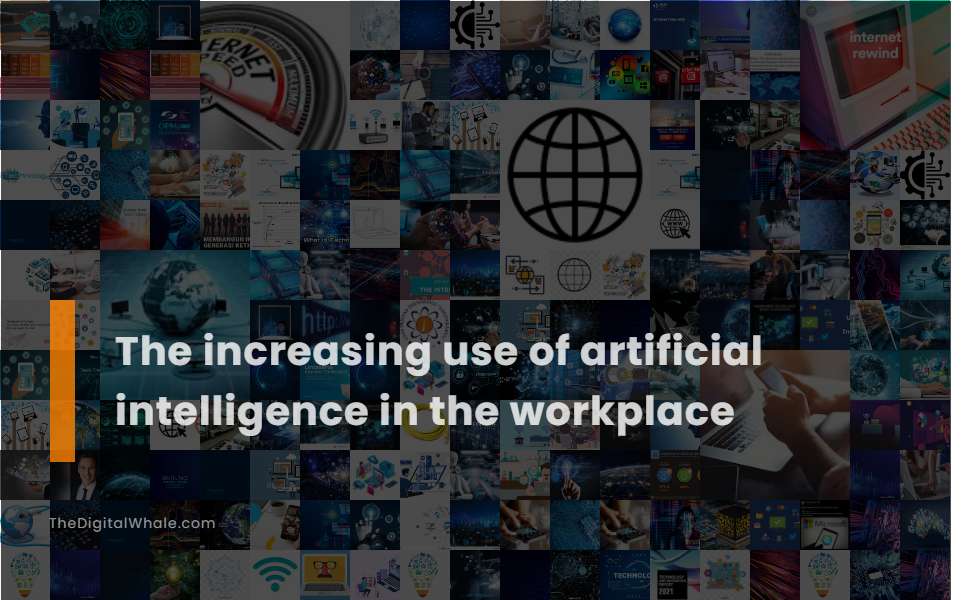The Increasing Use of Artificial Intelligence In the Workplace
What are some benefits of artificial intelligence in the workplace? What are some of the advantages of using artificial intelligence in the workplace? Let's find out more about The Increasing Use of Artificial Intelligence In the Workplace.

75% of knowledge workers use AI at work, with 46% adopting AI tools in the last six months.
Seventy-five percent of Knowledge Workers are using AI tools in their day-to-day tasks, with 46% of these workers adopting AI within the last six months, highlighting the rapid acceleration of AI integration in the workplace and its significant impact on work efficiency and job satisfaction. Discover more about these trends by visiting the AI Stats and Work Trends 2024 article for an in-depth analysis on how artificial intelligence is transforming daily workflows and enhancing productivity.
90% of users report that AI helps them save time, and 85% say it allows them to focus on crucial tasks.
The increasing use of AI in the workplace is significantly enhancing productivity, with 90% of users reporting that AI helps them save time and 85% stating that it allows them to focus on their most important work, enabling them to manage their tasks more efficiently and effectively. On platforms like Aiprm, it is evident that the integration of AI tools offers substantial improvements in work processes, empowering employees to dedicate more attention to the tasks that require human insight and creativity.
84% of users find that AI boosts their creativity, and 83% believe it makes their work more enjoyable.
The increasing use of AI in the workplace has significant benefits for employees, with 84% reporting that AI boosts their creativity and 83% believing it makes their work more enjoyable, highlighting the positive impact on both productivity and job satisfaction. For more detailed insights into these findings, visit the Comprehensive Summary of Microsoft's Findings on the Proserveit website, which offers an in-depth look at how AI is transforming the workplace environment for the better.
66% of leaders would not hire someone without AI skills, and 71% prefer candidates with AI skills even if they have less experience.
The increasing significance of AI skills in the hiring landscape is underscored by the fact that 66% of leaders have expressed reluctance to hire candidates lacking these capabilities. Moreover, a notable 71% of leaders demonstrate a preference for hiring a less experienced candidate equipped with AI skills over a more seasoned individual who lacks them. This trend highlights the urgent need for job seekers to develop and enhance their proficiency in AI technologies. For more insights on how this shift is reshaping the workforce, visit Flexos and explore the future of work dynamics.
77% of leaders believe AI will allow early-career talent to take on greater responsibilities.
The belief that AI will allow early-career talent to take on greater responsibilities is reflected in the Deloitte survey, where both early career workers and tenured workers anticipate that AI sets higher expectations for workers, enabling them to perform more complex and strategic tasks earlier in their careers.
Related:
What is the gig economy and what are its distinct dangers? What are some of the challenges that workersface in the gig economy? Let's find out more about The Gig Economy and Its Effect On Workers' Rights.
12% of recruiters are creating new roles specifically related to generative AI, with the role of Head of AI growing rapidly.
The 2024 Work Trend Index by Microsoft and LinkedIn highlights a significant increase in the use of generative AI at work, with many leaders emphasizing the importance of AI skills and the creation of new AI-related roles, such as AI ethicists and data curators, to support business strategies.
AI is expected to impact 80% of the US workforce, affecting at least 10% of their tasks.
AI is expected to impact 80% of the US workforce, affecting at least 10% of their tasks, as it automates routine and efficient processes, potentially influencing a significant portion of the labor market. This impact could vary in magnitude and scope, with some workers seeing up to half of their tasks affected by Generative AI.
14% of workers report being displaced by automation and replaced by robots.
There is no specific statistic indicating that workers are being displaced by automation and replaced by robots. However, recent AI In Workplace Statistics predict that between 2023 and 2027, 83 million jobs could be lost globally due to AI, while 69 million new jobs are expected to be created. This projection results in a net loss of 14 million jobs, highlighting the significant impact of AI on global employment trends.
AI is already used or considered by 77% of businesses, with large businesses twice as likely to use AI as small businesses.
AI is already utilized or considered by a significant majority of businesses, with over 80% of companies embracing AI to some extent. Larger enterprises are twice as likely to implement AI compared to smaller firms, highlighting the disparity in AI Adoption Rates between large and small businesses.
AI tools are automating routine tasks, enhancing decision-making, and improving customer engagement.
AI tools are increasingly used in the workplace to automate routine tasks such as data entry, invoice processing, and inventory management, enhancing decision-making through predictive analytics and data analysis, and improving customer engagement with AI-powered chatbots and sentiment analysis. For more information on how AI is transforming business operations, you can visit the Automating Routine Tasks with AI page on Galactic Advisors' website.
Related:
What are the pros and cons of living as a digital nomad? What are the pros and cons of working remotely? Let's find out more about Should We All Be 'Digital Nomads'? the Pros and Cons of Working Remotely.
